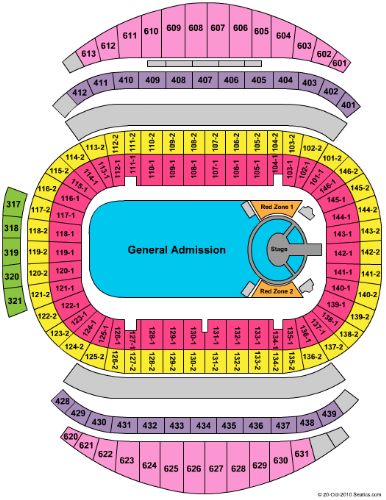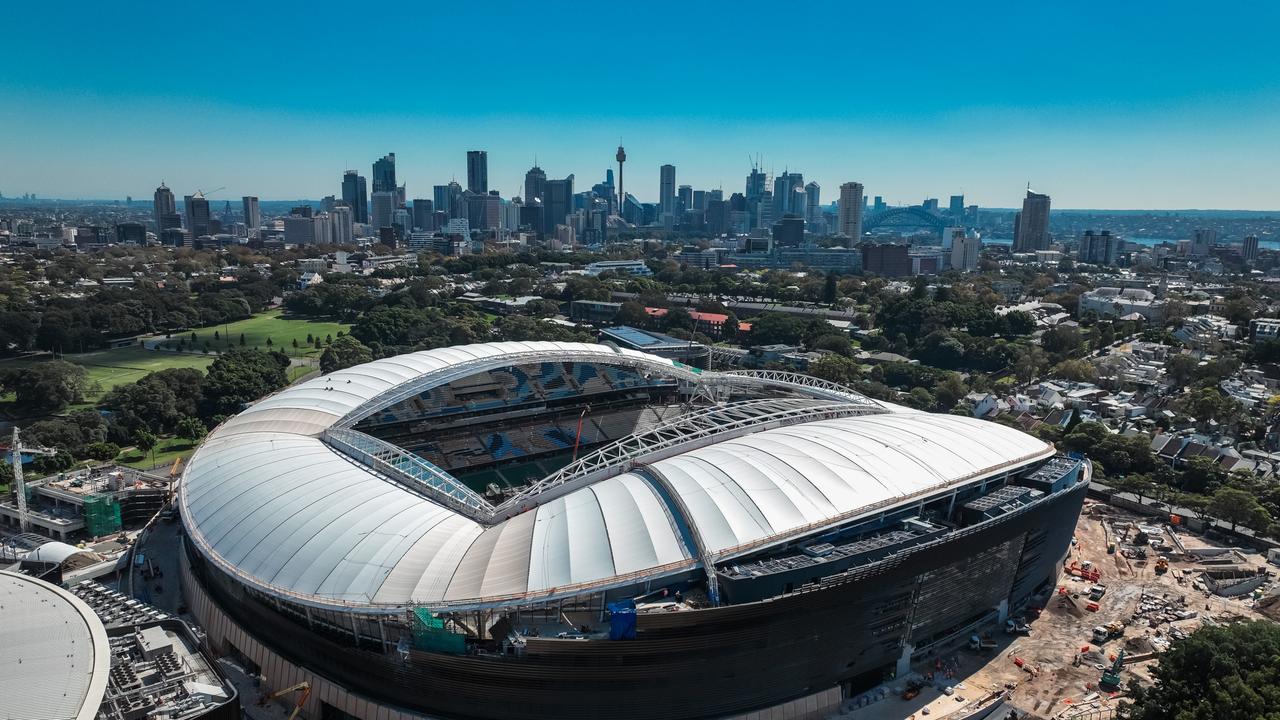Stadium Australia, which is now called Accor Stadium because of a sponsor, is a multi-use stadium in Sydney, Australia. It is in Sydney Olympic Park. Sometimes known in Australia as the Sydney Olympic Stadium, Homebush Stadium, or simply Olympic Stadium, the stadium was completed in March 1999 at a cost of A$690 million to host the 2000 Summer Olympics.
It was leased by a private company, Stadium Australia Group, until the stadium was sold back to the New South Wales government on 1 June 2016 after NSW Premier Michael Baird announced that the stadium would be redeveloped as a world-class rectangular stadium. The stadium is owned by Venues NSW on behalf of the NSW Government.
Before its redesign in the early 2000s, the stadium was designed to hold around 115,000 spectators, making it the largest Olympic stadium ever built and the second-largest stadium in Australia after Melbourne Cricket Ground, which held over 120,000. In 2003, changes were made to shorten the north and south wings and put in seats that could be moved.
These changes brought capacity down to 80,000, with the ability to add seats based on venue configuration. Canopies were also added over the north and south stands, allowing most of the seats to be covered. The stadium was designed along sustainable lines, for example using less steel in the roof structure than the Olympic stadiums in Athens and Beijing.
| Built In: | 12 September 1996 |
| Capacity: | 83,500 |
| Home Teams: | Sydney |
| Ground Size: | 170m x 128m (Oval) |
Australia Stadium History
Early history
The first sporting event held at the stadium was on 6 March 1999, when a record rugby league football crowd of 104,583 watched the NRL first round double header, featuring Newcastle v Manly and Parramatta v St George. Illawarra Dragons. The attendance broke the old record of 102,569 sets at the Odsal Stadium in Bradford, England, for the replay of the Challenge Cup final between Warrington and Halifax on 5 May 1954.
The first musical act to perform at the newly built stadium was the Bee Gees, consisting of Barry, Robin and Maurice Gibb, on March 27, 1999. The band had embarked on what would be their last world tour as a group before Maurice’s death. , ending the tour in the newly built Olympic Stadium. The show was sold out with an attendance of 66,285.
The stadium did not officially open until June 12, 1999, when the Australia national soccer team played the FIFA All Stars. Australia won the match 3-2 in front of a crowd of 88,101. Stadium Australia also hosted the national team’s historic victory over Uruguay in November 2005, a victory that gave Australia FIFA World Cup qualification for the second time in the country’s history. The event drew a virtual capacity crowd of 82,698.
The 1999 Bledisloe Cup rugby match between Australia and New Zealand drew a world record rugby union crowd of 107,042. In 2000, this was improved when a nearly full crowd of 109,874 (capacity at the time was 110,000) witnessed the “greatest rugby match ever” when Jonah Lomu’s try sealed an All Blacks victory over the Wallabies 39-35. The All Blacks had led 24-0 after 11 minutes only to see Australia draw 24-24 at half time.
On July 18, 1999, an exhibition soccer match was played between the Australian national team and the English club Manchester United. Manchester United defeated Australia 1-0 in front of 78,000 spectators.
On June 9, 1999, the stadium hosted its first game of the State of Origin series between New South Wales and Queensland. The match, Game 2 of the three-game series, saw Origin’s record Sydney attendance as 88,336 watched the Blues christen their new home with a 12–8 victory. The attendance broke Origin’s record attendance of 87,161 sets at the Melbourne Cricket Ground for Game 2 of the 1994 series.
On August 7, 1999, the Denver Broncos and San Diego Chargers played a National Football League exhibition game called the American Bowl, which brought home former Australian Football League player Darren Bennett, kicker for the Chargers. The Broncos won the game 20-17 in front of 73,811 spectators. This was Australia’s first and only American Bowl game.
The 1999 National Rugby League Grand Final, played on 26 September between the Melbourne Storm and St George Illawarra Dragons, broke the rugby league world record set earlier in the season when 107,999 turned out to watch the Storm defeat the Dragons 20-18 to win his first NRL premiership.
During the 2000 Summer Olympics, the afternoon track and field sessions on the 11th drew 112,524 spectators on the night Australia’s Cathy Freeman won the Olympic gold medal in the women’s 400m. As of 2014, this remains the world attendance record for any track and field event. Also during the Olympics, the soccer final drew 104,098 to watch Cameroon defeat Spain for its first Olympic gold medal. This was an Olympic football attendance record, breaking the record of 101,799 sets at the Rose Bowl during the gold medal game of the 1984 Olympics in Los Angeles.
The stadium’s 110,000 seats were all filled for the opening ceremony of the Summer Olympics in 2000, and the closing ceremony of the same Games had the highest attendance of any modern Olympic event at 114,714. The closing ceremony musical acts included Kylie Minogue, John Williamson, John Paul Young, Jimmy Barnes, Midnight Oil, INXS (with Jon Stevens), Men at Work, and Slim Dusty, which Waltzing Matilda performed. Other famous Australians, including golfer Greg Norman and comedian and actor Paul Hogan, also attended the stage during the closing ceremony. The venue also hosted the same events during the 2000 Summer Paralympics.
Naming rights
When it first opened in 1999, the stadium didn’t have a sponsor for the naming rights, so it was called Stadium Australia until 2002. In 2002, the naming rights were bought by the telecommunications company Telstra, which is why the stadium is now called Telstra Stadium. On December 12, 2007, Stadium Australia Group (SAG) announced that the name of the stadium would be changed to ANZ Stadium after closing a deal with ANZ Bank worth around A$31.5 million over seven years. This change came into effect on January 1, 2008. In 2014 ANZ renewed the agreement until the end of 2017 and again until its closure for rebuilding in October 2019.
In December 2020, ANZ’s naming rights to the stadium expired and it reverted to Stadium Australia.
In November 2021, the multinational hotel Accor acquired the rights and the venue will be known as Accor Stadium.
Development
In October 2001, major reconfiguration work began on the stadium to allow sports that require an oval pitch, such as cricket and Australian rules football, to be played on the field. The two side stands and the athletics track were removed; they were replaced by a movable seating section. New roofs were built at both ends and seats that had a poor view of the field were removed. The reconfiguration reduced capacity to 84,000 for the rectangular field and 82,500 for the oval field at a total cost of $80 million. Construction work was carried out by Multiplex.
The reconfiguration work was completed in October 2003 in time for the 2003 Rugby World Cup, where the then Telstra Stadium hosted the opening match, two other group matches, both semi-finals, the third-place match, and the final of the competition. In the first semi-final on November 15, 2003, Australia beat New Zealand 22-10, and then in the second semi-final the next day England beat France 24-7. In the final, on November 22, England beat Australia 20-17 after extra time.
In 2022, a new scoreboard was installed at the south end of the stadium, measuring 120 meters wide. Also in 2022, the stadium lighting was replaced with new LED sports lights and used for the first time in Game One of the series. State of Origin from 2022.
Stadium Capacity
Australia Stadium has a seating capacity of 83,500.
Australia Stadium Seating Plan

Notable Events & Records
Records
114,714: 2000 Olympics closing ceremony
Upcoming Events
Not Yet.
Parking
P1 Car Park is conveniently located directly opposite Stadium Australia. It is highly recommended to reserve car spaces in advance and it is easy to do so online. Alternatively, Stadium Australia can arrange prepaid P1 car park tickets for delegates.

